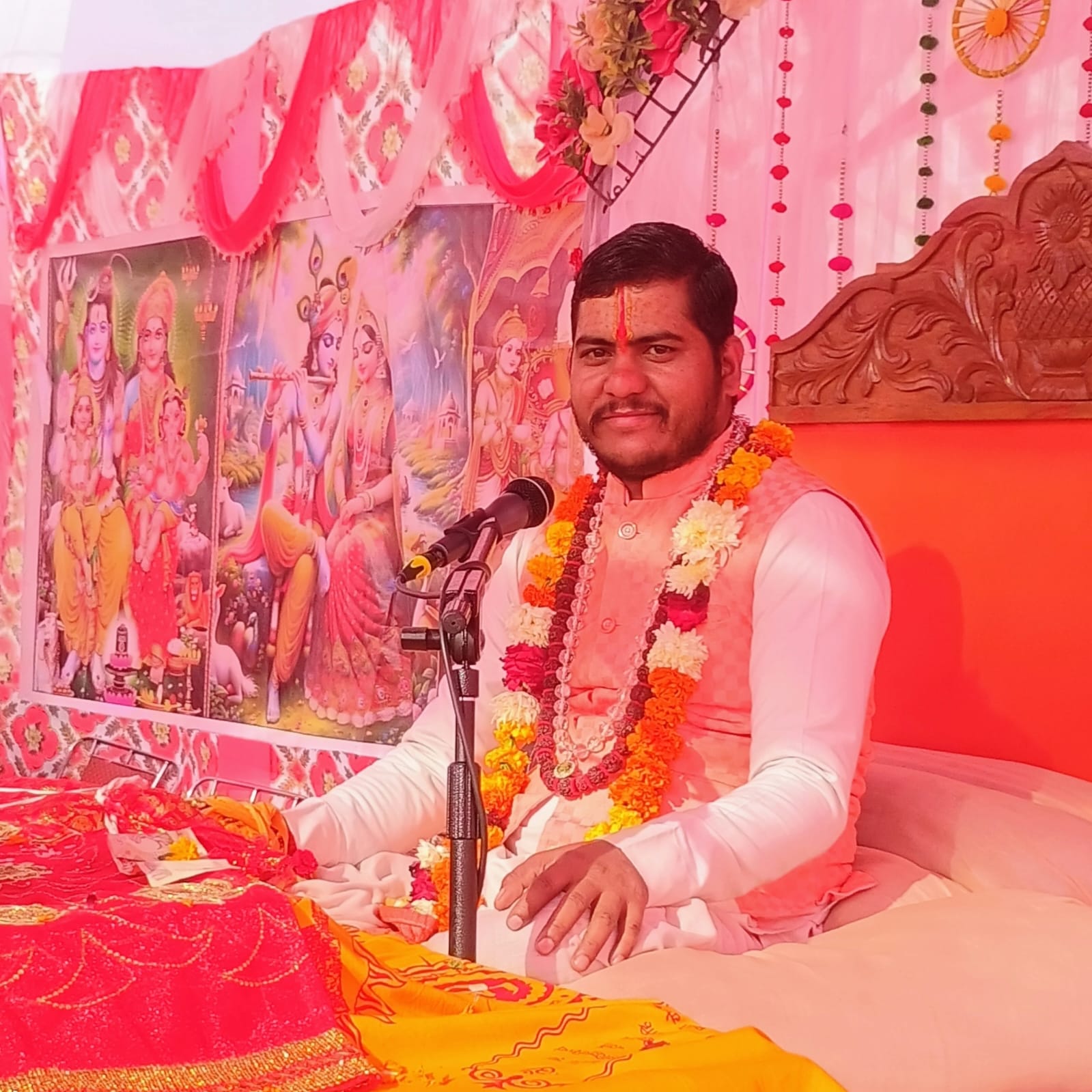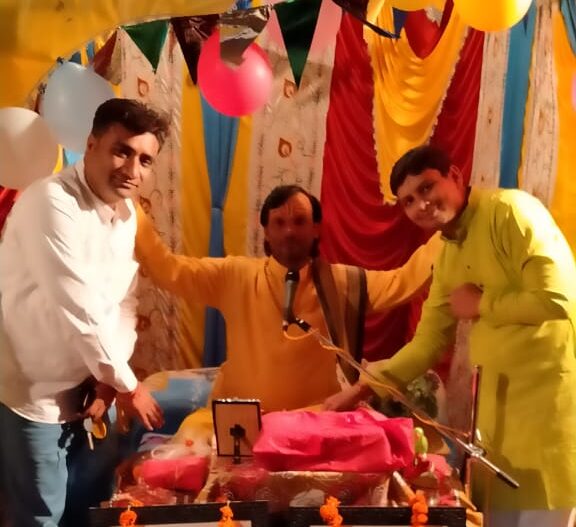
Tirith Shradh Pooja
Tirth Shradh Pooja is a significant ritual in Hinduism, which involves performing Shradh (ancestral rites) at a sacred place or tirth (pilgrimage site). The word Tirth refers to a holy place or a place of spiritual significance, often associated with rivers, temples, and other places revered in Hindu tradition. This type of Shradh is believed to carry immense spiritual benefits, as it is performed in sacred locations that are considered particularly auspicious for honoring and offering prayers to deceased ancestors.
The practice of performing Tirth Shradh Pooja is typically observed when individuals want to pay homage to their ancestors and seek their blessings, peace, and liberation. It is a way to ensure that the departed souls receive proper respect and offerings in a place of divine energy, where the spiritual vibrations are believed to be strong.
Significance of Tirth Shradh Pooja:
Honoring Ancestors: Tirth Shradh is performed to honor the ancestors, ensuring that their souls find peace and are relieved from any suffering they might be experiencing in the afterlife. It is believed that performing Shradh at a sacred tirth brings extra spiritual merit and is more powerful than performing it at home.
Spiritual Cleansing: The ritual is considered purifying both for the ancestors’ souls and for the living family members. It is thought to remove any ancestral curses or unfulfilled rituals and brings blessings to the family. This is particularly important if the family has been experiencing misfortune or difficulties due to ancestral debts or negative karmas.
Liberation of Souls: Tirth Shradh is believed to aid in the release of the souls of the ancestors from the cycle of rebirth and help them attain moksha (liberation), which is the ultimate goal in Hindu philosophy.
Cosmic Harmony: By performing the Shradh at a sacred location, the individuals performing the ritual align themselves with the spiritual energies of the tirth and create a stronger connection to the divine, thus ensuring harmony and peace in their lives and the lives of their descendants.
When is Tirth Shradh Pooja Performed?
Pitr Paksha: It is commonly performed during Pitr Paksha, a 15-day period in the Hindu lunar calendar (usually in September), dedicated to honoring ancestors. During this time, family members offer food, prayers, and rituals for their deceased ancestors. Performing the Tirth Shradh during this period is considered highly auspicious.
Amavasya (New Moon Day): Another significant time for performing Tirth Shradh is during the Amavasya (new moon) of every month, particularly the Shradh Amavasya, which is believed to be an ideal time to honor the ancestors and offer prayers for their peace and well-being.
Special Family Occasions: The Tirth Shradh can also be performed on specific occasions, such as the death anniversary of an ancestor, or when a family experiences repeated misfortune or hardship that may be attributed to unresolved ancestral issues.
Key Locations for Tirth Shradh Pooja:
Tirth Shradh is generally performed at a sacred or holy place that has been historically revered for spiritual activities. Some common locations where Tirth Shradh can be performed include:
- Holy Rivers: Rivers like the Ganga (Ganges), Yamuna, Narmada, and Kaveri are considered highly sacred in Hinduism, and performing Shradh near these rivers is believed to provide immense spiritual benefits.
- Temples: Temples dedicated to Lord Vishnu, Shiva, or other deities are considered ideal locations for Tirth Shradh. Famous pilgrimage sites like Haridwar, Kashi (Varanasi), Rishikesh, Nasik, and Tirupati are some of the most popular places to perform this ritual.
- Other Sacred Locations: Other pilgrimage sites such as Kedarnath, Badrinath, Dwaraka, Mathura, and Dwarka are also regarded as perfect places for performing Tirth Shradh.
Steps Involved in Tirth Shradh Pooja:
The general process of performing a Tirth Shradh involves several important steps, and it is often conducted by a knowledgeable priest (Pandit) familiar with the proper rituals. The steps can vary slightly depending on the region, tradition, and the guidance of the priest, but typically include:
Preparation:
- The family prepares offerings such as rice, barley, sesame seeds, ghee, fruits, and flowers. A clean and sacred space is prepared near the tirth (pilgrimage site), often near the banks of a river or within a temple compound.
- The family members take a bath in the sacred river or visit the temple to purify themselves before the ritual begins.
Invocation of Ancestors:
- The priest invokes the presence of the ancestors’ souls, calling them to partake in the offerings. This is done by chanting pitr mantras (ancestral mantras), Narayan mantras, and other prayers that honor the ancestors. The individual performing the Shradh may also recite personal prayers for the peace of their ancestors’ souls.
Offering of Pindas:
- A symbolic offering of rice balls (pindas) is made for each of the ancestors. These pindas are prepared with rice, sesame, barley, and ghee, and they are offered in the river or placed near the temple. The priest may also offer these pindas in the form of symbolic items such as coconuts or fruits.
Tarpan (Water Offering):
- The ritual involves the offering of water mixed with sesame seeds (til) and barley (yava) to the ancestors. This offering, called tarpan, is done by standing in the river or at the sacred place, as it is believed that water is the medium through which the ancestors’ souls receive the offerings.
Recitation of Mantras:
- The priest recites important mantras such as the Pitr Mantra, Narayan Mantra, and Maha Mrityunjaya Mantra, invoking divine blessings for the ancestors and the family members. The family also participates in these recitations as a sign of devotion and respect for their ancestors.
Feeding Brahmins and the Poor:
- It is customary to feed Brahmins (priests) and the poor as part of the ritual. This act of charity is believed to bring spiritual merit and blessings for the family. It is also a way of honoring the ancestors, as sharing food with others is considered a pious act.
Completion of Rituals:
- After the pindas and tarpan are offered, the priest completes the ritual with additional prayers for the well-being of the ancestors and their peaceful transition to the divine realm. The family members may offer thanks and seek blessings for themselves and future generations.
Benefits of Tirth Shradh Pooja:
Peace and Liberation for Ancestors: The primary purpose of performing Tirth Shradh is to ensure the peace and liberation of the ancestors’ souls. By offering prayers and fulfilling ancestral duties, it is believed that the souls are released from any lingering earthly attachments and attain moksha (liberation).
Removal of Pitra Dosha: This ritual is often seen as a remedy for Pitra Dosha, a condition caused by unfulfilled ancestral rites, which can lead to family misfortune. Performing Tirth Shradh helps alleviate the negative effects of this dosha and restores balance to the family.
Spiritual Merit and Blessings: Offering prayers and performing rituals at a sacred location is believed to bring divine blessings, protection, and peace to the living family members. It also ensures the prosperity and well-being of future generations.
Improvement in Family Life: By completing the ancestral rites in a sacred place, it is believed that the family experiences positive changes in their life, including improved relationships, health, career success, and overall well-being.
Conclusion:
Tirth Shradh Pooja is a powerful and meaningful ritual that connects the living with their ancestors in a spiritually significant way. By performing this ritual at a holy tirth, individuals seek to honor their ancestors, provide them with peace and liberation, and remove any negative karmic influences or misfortunes from their own lives. The ritual is a demonstration of respect, gratitude, and the desire to fulfill spiritual obligations to those who have passed away, ensuring harmony and prosperity for the family and future generations.
Our Priest (Acharyas)

Acharya Pandit Sachin Anthwal ji
Acharya Sachin Anthwal began his educational journey at Shri Ved Mahavidyalaya, Rishikesh, where he received profound knowledge of the Vedas and scriptures. He later completed his Master's degree in Hindi from Hemwati Nandan Bahuguna Garhwal University and obtained his B.Ed degree from Kurukshetra University, Haryana. Since 1996, Acharya Sachin Anthwal has been actively working in the fields of Pooja, Astrology, Vastu, Palmistry, and all types of rituals. With his vast experience and deep knowledge, he has become a prominent figure in this field, helping bring positive transformation to individuals' lives.

Acharya Pandit Pradeep Tailwal
Acharya Pandit Pradeep Tailwal is a highly experienced spiritual guide with over 16 years of expertise in the fields of Pooja, Astrology, Vastu, and various rituals. With a deep understanding of ancient scriptures and spiritual practices, he has helped countless individuals achieve peace, prosperity, and harmony through his insightful guidance and rituals. His years of dedication and profound knowledge make him a trusted and respected figure in the spiritual community.

Acharya Pandit Uday Kar Pant
Acharya Pandit Uday Kar Pant brings over 18 years of profound experience in the fields of Vedic rituals, Astrology, Vastu Shastra, and Spiritual Counseling. Known for his deep spiritual wisdom and practical approach, he has helped numerous individuals overcome life's challenges through his accurate astrological insights and personalized spiritual solutions. His commitment to preserving traditional practices while adapting to modern needs has made him a trusted guide for those seeking spiritual growth and harmony.

Pandit Sanjay Krishna Ji
Pujya Param Shraddheya Saras Katha Vyas Acharya Pandit Sanjay Krishna Ji was born in Uttarkashi, near the sacred Yamunotri Dham. He is an accomplished spiritual guide, renowned for his deep knowledge and discourses on various sacred texts, including Ram Katha, Shreemad Bhagwat Katha, Shiv Mahapurana Katha, Gau Katha, and Shreemad Devi Bhagwat Katha. With over 7 years of experience in delivering these divine teachings and 10 years of expertise in Astrology and Karmakand, he has been actively serving the spiritual community. Currently, he is based in Haridwar, where he is associated with the ancient Ganesha Temple and continues to inspire and guide countless individuals through his enlightening discourses and spiritual practices.

Dr. Pandit Mahesh Gaud
Dr. Pandit Mahesh Gaud is a distinguished spiritual guide and scholar with an impressive 23 years of experience in the fields of Astrology, Vedic Rituals, and Spiritual Counseling. With a deep understanding of ancient scriptures and a refined approach to modern spiritual practices, Dr. Gaud has helped numerous individuals achieve personal transformation, peace, and prosperity. His vast experience spans across performing intricate poojas, guiding clients with precise astrological insights, and offering remedies that bring harmony to their lives. Known for his wisdom, dedication, and compassion, Dr. Pandit Mahesh Gaud is a trusted name in the spiritual community, guiding people on their spiritual journeys with authenticity and sincerity.

Dr. Dwarka Prasad Ji
Dr. Dwarka Prasad Ji is a highly respected Bhagwat Acharya with an extensive experience of 27 years in the field of spiritual teachings and Vedic rituals. With a profound understanding of ancient scriptures, he has dedicated his life to spreading the divine knowledge of Shreemad Bhagwat Katha and guiding individuals towards spiritual enlightenment. Dr. Dwarka Prasad Ji is known for his insightful discourses, in-depth understanding of spiritual texts, and his ability to connect with people on a deep, personal level. His decades of experience have earned him great respect in the spiritual community, making him a trusted mentor and guide for those seeking peace, prosperity, and divine wisdom.